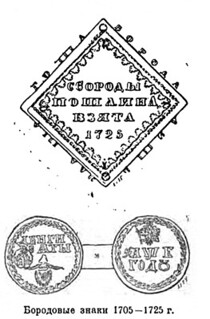
PREV ARTICLE
FULL ISSUE
PREV FULL ISSUE
FEATURED WEB PAGE: BEARD TAXThis week's Featured Web Page is a Wikipedia history of beard taxes and the Russian beard tokens.
In 1698, Emperor Peter I of Russia instituted a beard tax to bring Russian society in line with Western European models. To enforce the ban on beards, the tsar empowered police to forcibly and publicly shave those who refused to pay the tax. Resistance to going clean shaven was widespread with many believing that it was a religious requirement for a man to wear a beard. The tax levied depended upon the status of the bearded man: those associated with the Imperial Court, military, or government were charged 60 rubles annually; wealthy merchants were charged 100 rubles per year while other merchants and townsfolk were charged 60 rubles per year; Muscovites were charged 30 rubles per year; and peasants were charged two half-kopeks every time they entered a city.

https://en.wikipedia.org/wiki/Beard_taxWayne Homren, Editor The Numismatic Bibliomania Society is a non-profit organization promoting numismatic literature. See our web site at coinbooks.org. To submit items for publication in The E-Sylum, write to the Editor at this address: whomren@gmail.com To subscribe go to: https://my.binhost.com/lists/listinfo/esylum All Rights Reserved. NBS Home Page Contact the NBS webmaster 
|